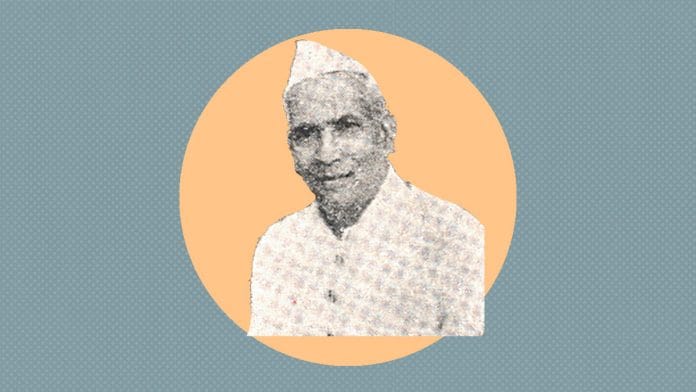Algu Rai Shastri, a member of the Constituent Assembly, was against forced religious conversions and known for denouncing views of religious minorities.
New Delhi: Algu Rai Shastri, a member of the Constituent Assembly, was a socialist who strongly backed the demand to conduct government proceedings in Hindi. He denounced English as a foreign language that should have left with the British.
Among the more radical of the Congress leaders, Shastri, a staunch member of the Arya Samaj, also debated vociferously against forced religious conversions and was known for denouncing views of religious minorities.
Early life
Shastri was born in the United Provinces’s (now Uttar Pradesh) Mau district on 29 January 1900. He received his education from the Mission School in Varanasi (then Banaras) and graduated from Kashi Vidyapith University in the same city.
He held several political portfolios in his life. He was the secretary of the Meerut District Congress Committee from 1928-1930, secretary of the Delhi Provincial Congress Committee from 1930-1933, Member of Legislative Assembly of United Provinces during the period 1937-1952 and president of the Uttar Pradesh Congress Committee in 1951.
He was also a member of several committees and political bodies. Shastri had been a member of the All India Congress Committee from 1928 up until his death in 1967.
Also read: The Kerala governor who openly pushed Indira’s case for PM
Role in the Constituent Assembly
Shastri’s opening speech in the assembly was one of resounding support to a resolution moved by then Prime Minister Jawaharlal Nehru that aimed to affirm India’s status as an Independent Sovereign Republic and for rights to be granted to all citizens based on key fundamental principles.
His speech also outlined the territories, then not part of the country, that he said should be a part of India.
“The territories of Pondicherry, Goa, Daman and Diu, at present under foreign domination, also form parts of India. I wish these all together with Nepal, Bhutan and Sikkim, which constitute our frontier, should also be included in this free land,” he said.
It was also during this speech that he asserted his resolve to address the assembly only in Hindi.
On religious conversions
Shastri vehemently supported an amendment calling for legislation against ‘forced’ religious conversions, particularly arguing that at no cost should children be allowed to succumb to such conversions even if for some unavoidable reasons their parents had to.
“You tempt the innocent little ones whom you take in your lap, by a suit of clothes, a piece of bread and a little toy and thus you ruin their lives. Later, they repent that they did not get an opportunity to have a religion of their choice,” he said.
On tabling amendments in Hindi
Time and again, Shastri sought to get Hindi as the preferred language for discussing the draft versions of the Constitution during the assembly’s sessions.
Although president of the Constituent Assembly Dr. Rajendra Prasad reminded Shastri that the final version of the Constitution would be framed in Hindi, Shastri remained steadfast in arguing not only that the original draft of the Constitution be prepared in Hindi but the amendments that were being tabled in the Assembly should also be in Hindi, and not in English.
Also read: Gokulbhai Bhatt, the Constituent Assembly member who called the Constitution ‘un-Indian’
Ultra-socialism and death
Shastri was an ultra-socialist but was part of the Arya Samaj, a Hindu reform movement launched in 1875, which renounced Hinduism’s traditional practices such as idol worship, practice of untouchability, belief in multiple gods, and aimed at reaffirming the supremacy of Vedic scriptures and their teachings.
Shastri launched his Samaj-related activism in Meerut district.
In a speech in December 1933, as secretary of the All-India Achhutdhar Committee (worked towards uplifting the lives of untouchables), he underscored the role socialism could play in elevating the social stature of the ‘depressed classes’.
Over the years, he then gradually based his speeches and activism from a more ‘Hindu’ vantage point on matters of political importance, even dismissing and condemning views of other religious communities such as Muslims.
By 1946, Shastri was no more a believer of the key tenets of Mahatma Gandhi’s satyagraha movement and, instead, hailed the credibility of physical organisation and militaristic volunteer movements in defending one’s country, religion and community.
He passed away on 12 February 1967.






